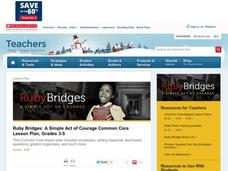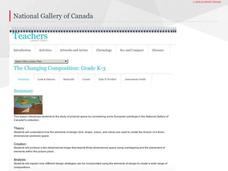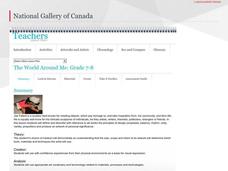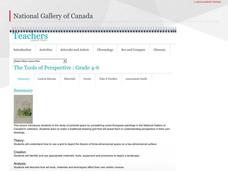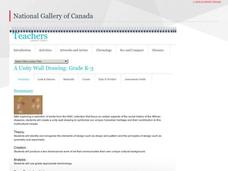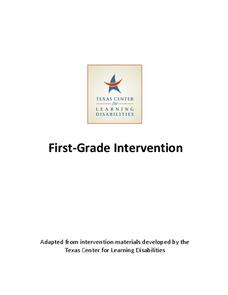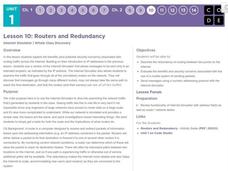Scholastic
Ruby Bridges: A Simple Act of Courage, Grades 3-5
Through character trait graphic organizers, a vocabulary sorting activity, class discussion, and a civil rights movement slide show, your young historians will be introduced to the amazing story of Ruby Bridges and her experiences as the...
National Gallery of Canada
Contemporary Reflections
Combine art and writing in a lesson about legends. After viewing Inuit art, class members examine their own cultural surroundings in order to write and visually represent a legend. Individuals are invited to take the creative reins when...
National Gallery of Art
Impressive Prints
Explore printmaking with a discussion and project. Pupils first view and talk about various examples of prints and cover positive and negative space. They then come up with fictional animals and make prints of their creature using...
National Gallery of Canada
My World
Art can tell viewers about an artist's personality and background. Have your learners look at Inuit art and consider subject matter and how it relates to the artist and his or her world. The related art project requires pupils to create...
National Gallery of Canada
My First Print
Practice printmaking with a fun lesson. After observing images, class members use the listed materials, such as stamps and sponges, create their own prints. They experiment with layering, pressure, and paint colors.
National Gallery of Canada
The Changing Composition
Play with dimensions and practice making a two-dimensional scene look three-dimensional. Class members view pieces of art and then make their own scenes by layering different materials and drawing in details. Check out all the tabs for...
National Gallery of Canada
Memories of the Past
Explore contemporary American Indian art. After viewing a set of images, class members discuss the design elements of techniques present, as well as how these artists represent history and culture. Learners examine the parfleche and...
National Gallery of Canada
The World Around Me
Have your learners use their surroundings as inspiration for an art project. Class members first examine and discuss art. They then choose an area and spend five days taking down observations in written and sketch form. These...
National Gallery of Canada
My Upside-Down World!
M.C. Escher is famous for creating optical illusions. Examine this effect in several of his works and discuss the techniques involved. Inspired by the discussion, learners create an imaginary 3-D world inside of a box using various...
National Gallery of Canada
The Tools of Perspective
Make a study of perspective in the real world. Learners examine and discuss works of art that show examples of perspective before trying their own hands at it. Using a grid drawn on transparent paper, class members transfer a view from a...
National Gallery of Canada
Reading Sculptures
Consider the elements and principles of design closely while examining works of art. Learners select an image from the provided pieces to write about in relation to the elements and principles of design. They then sketch and sculpt their...
National Gallery of Canada
A Unity Wall Drawing
Build class community with an art project. Learners first examine and discuss works of art. They then contribute to a class mural by tracing their hands and decorating them in relation to their own cultures. The final mural...
National Gallery of Canada
Class Commission
Simulate a real-life situation with a project proposal activity for an art installation. Learners look at work by Joe Fafard and examine his website for information about public art displays. They also search for other proposals for...
National Gallery of Canada
Tantalizing Tessellations!
Examine repeating and intricate patterns with a study of M.C. Escher and a related art activity. Pupils view and discuss the artwork before creating their own tessellating patterns. Step-by-step instructions for creating a template are...
Texas Center for Learning Disabilities
First-Grade Intervention
Learning how to read is a big challenge for young learners, but this series of lessons provides them with the extra support they need to succeed. With each lesson following the a clearly outlined format, children are introduced...
What So Proudly We Hail
The Meaning of America: Equality
What if society sought equality by handicapping the gifted and dispelling any traces of diversity? Kurt Vonnegut Jr. offers one possible answer to this question through his incredibly engaging and thought-provoking satirical...
Code.org
Sending Numbers
Binary graphing ... bit by bit. Pairs work together to develop a protocol in order to send the points of a graph. One partner sends the points and the other receives them and tries to recreate the graph. The pupils use the rubric to...
Code.org
Encoding and Sending Formatted Text
Introduce your class to encoding text. Pairs work together to create a protocol to send text prior to learning ASCII encoding. Groups then collaborate to send and translate ASCII codes creating a formatted text message.
Code.org
The Need for Addressing
You sunk my battleship via the Internet? Groups of three play a modified game of Battleship using the Internet Simulator. Team members determine how to address messages, so each player knows who the message is for, and refine their text...
Code.org
Routers and Redundancy
How are messages to the right recipient? Introduce the concept of routing Internet traffic by drawing a comparison to sending a letter. Groups use the Internet Simulator program to send messages to others using the same router...
Code.org
How Routers Learn
Your routers don't seem to be routing correctly. To figure out why, pupils act like routers, talk to their direct connects in order to determine as much information about the simulated network as possible. As they learn more about...
Code.org
Bytes and File Sizes
A bite of bits. The first activity in a unit of 15 introduces the class to the byte. Pupils learn about other standard units for measuring file sizes, develop an understanding of relative sizes and the kind of units used to measure...
Code.org
Check Your Assumptions
Always check your assumptions when interpreting data and data visualizations. That's the take away from this exercise. Class members examine a failed project that looks at search trends to predict flu outbreaks and consider the...
Code.org
The Need for Algorithms
Pairs work through two scenarios that require them to generate an algorithm. The first activity requires pairs to define a common language to use; the second comes with the language. The pairs then must determine how to code the...
